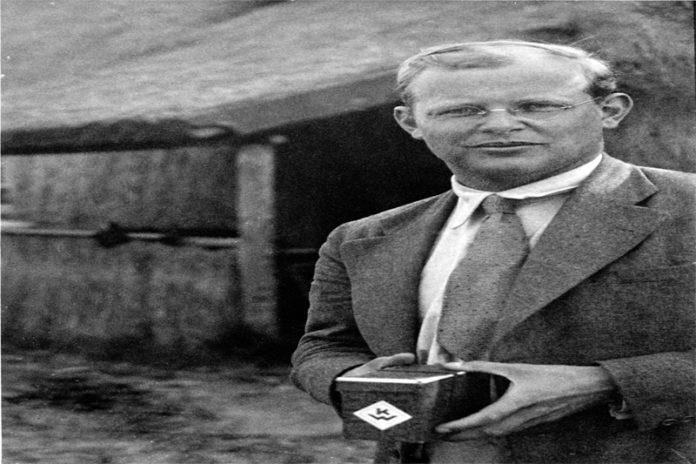Book of his years in Barcelona and a new biography bring to the present Dietrich Bonhoeffer, German theologian executed for attempting to assassinate the Führer
ALEJANDRO Partal
Hegel said that the great men are those who in their time were aware of what was necessary. Dietrich Bonhoeffer (Breslau, 1906), in addition to one of the most important theologians of the twentieth century, was a man who had this consciousness, which he called “Theology of Concrete” and which led to the last consequences: dying for trying to save the rest. He broke the distance between thought and action, and this destined him to be a teacher who taught in class that Christ meant freedom, to be a pastor to create community and ultimately end up hanged in the concentration camp of Flossenbürg, accused of being behind Of the conspiracy that attempted to assassinate Hitler.
Despite his premature death, he left a work that marked the contemporary theological thought, and that today continues to inspire a profound interest. Good proof of this is the recent publication of the biography Extraña Gloria. Life of Dietrich Bonhoeffer, (Strange glory. The life of Dietrich Bonhoeffer), written by Professor Charles Marsh and published by Trotta, Spanish publisher who in 2018 also edited the letters and texts written during the season that the German thinker passed in Barcelona, in the evangelical community of the capital Catalan, gathered under the title Comunidad and Promesa (community and promise).
The son of a large, cultured, committed and wealthy family — his mother was a countess and her father was one of the most important psychiatrists in Germany — spiritual without being strictly religious, young Dietrich felt very early the call of faith: still a child, He played baptizing in the garden of his house, and at the age of 13 he sentenced in a family meal that he alone would undertake to reform the church. Shortly after the death of his elder brother, struck by a projectile in the First World War, Dietrich announced to his family that he had decided to become a theologian. His first travels, to Rome, where he lived in love with Holy Week, and then Tripoli and Spain, were shaping his faith. In Barcelona lived joyful months and had time to travel the country, from the Rastro of Madrid (famous popular market of the Spanish capital), where he bought an oil “that for me is very good and interesting, signed by Picasso”, to Seville, where he was drunk with “the Amount of young dressed and of remarkable beauty seen by the city “. During these years of youth he proved that his spiritual vocation became increasingly humanistic, more conscious of what he would end up calling “Arreligious Christianity”, which centered on the language of love, and not in the other perversions of which approached the religious.
As Charles Marsh says in this perhaps definitive biography, in the first sentence of his doctoral thesis he warned: “In this study, social philosophy and sociology will be used in the service of theology.” But in fact it was he who placed himself in the service of others, to the attention of the rest. And this feeling solidified during his first trip to the United States in September 1930, where he met Professor Reinhold Niebuhr, a theologian who advocated that “the question about how to analyze the social situation to meet the needs was more Relevant to theology than all the morphosyntactic analysis to which the Sacred scriptures were subjected. ” The teacher’s courage and honor ended up infecting the young German, whose vision of theology changed definitively when he prayed with the blacks of Harlem in the Abyssinian Church. From that moment his theology became more accessible, not to mention evident, and, as Marsh says, began to seek in the Christian and Jewish religions the inspiration for peace and the values of citizenship.
But while Dietrich grew up as a person in the United States, his country sank into fascism. In a letter received, his brother Klaus warned him of the growth of the far right, and warned that if these feelings could also capture the cultured classes, it would soon be “the end of this nation of poets and thinkers”. You weren’t wrong. Shortly thereafter, on January 30, 1933, Hitler was appointed new Chancellor of the Reich. Nazism came to power, colleges and ecclesiastical groups that ended up forming the German Christians (CA), who claimed that “God chose a new Israel, the German Volk. They even convinced themselves that Jesus had not been Jewish. ” Barbarism was consolidated on April 7, when the Reichstag approved the Aryan paragraph. Bonhoeffer, already almost in the quality of theological dissident, told his students that “the only hope was in the baby born of Jewish parents, not married, in the distant village of Bethlehem.” Expelled little by little from the university, he continued to give his course at the Seminary of the confessional church in Finkenwalde, a free space of Nazism northwest of Berlin. Among his disciples he met Eberhard Bethge, who turned out to be his faithful companion until the end, and perhaps the great love — not consummated — of his life.
At the beginning of 1939, Hitler announced his goal of total destruction of the Jewish race. And the theologian decided that the time had come to go to action. He entered the clandestine resistance with one goal: to kill Hitler. While it kept writing. In his book Ethics said that “the church was silent when it should have screamed, because the blood of the innocents cried out to the heavens.” It lasted in the resistance until March 13, 1943. That day a colleague put a ticking time bomb on a plane that Hitler was supposed to climb. But the detonator failed.
When they knocked on the door of his house on the night of April 4, 1943, Bonhoeffer was sitting in the oak office where so many hours had passed since his childhood. Before they took him, he had time to hide the ethics manuscript between a beam. During his hard captivity, despite the limited amount of paper, he continued writing letters and texts that Bethge later gathered in the famous book resistance and submission: letters and notes written in prison, transformed today into a classical literature Theological.
On the night of April 8th he was found guilty and sentenced to death. The next morning he and other colleagues were led naked to the gallows. The field physician who accompanied him in his last hours stated that he saw the pastor “kneeling and praying fervently to God.” He added that, again, at the place of execution, he pronounced a brief plegary before climbing the last “courageous and serene” steps. Perhaps it was the verses 19-20 of Psalm 119, the longest of all the Psalms, which accompanied him: “My soul is consumed wishing your judgments all the time.” But his possible last words that passed to history were: “This is not the end for me; Is the beginning of life. ” I was 39 years old.















